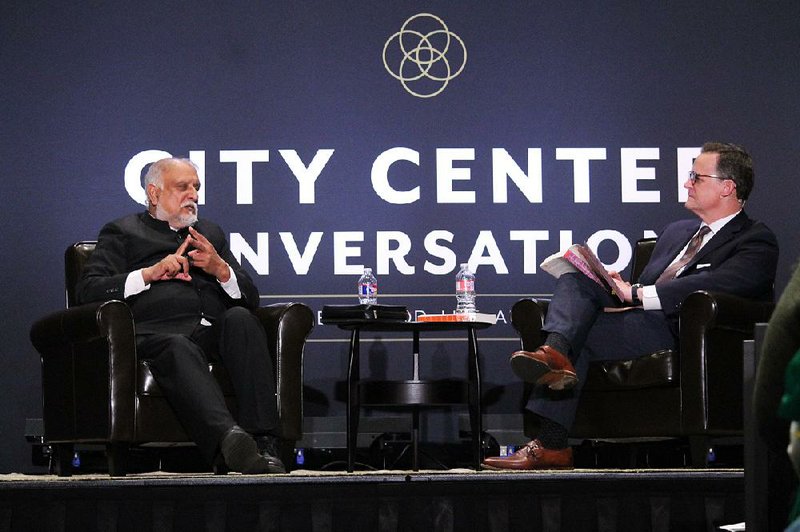The Bible and a biblical worldview were key in shaping the world as it is today, Indian Christian philosopher and author Vishal Mangalwadi told an audience of several hundred Tuesday at Robinson Center Performance Hall in Little Rock.
Mangalwadi, a Christian author from India, was the guest for City Center Conversations, a series modeled after best-selling Christian author Eric Metaxas' "Socrates in the City" series in New York. His appearance marked the sixth event in the series, which is hosted by Immanuel Baptist Church, and its senior pastor, the Rev. Steven Smith.
Named "India's foremost Christian intellectual" in 1998 by Christianity Today, Mangalwadi founded the Revelation Movement in 1995, which seeks "to re-establish the cultural authority of [truth]" that God revealed in his words, in nature and in culture, according to his website.
Mangalwadi's visit came on the 100th day of a 100-day speaking tour across multiple continents, he told the audience, and comes months after the release of his latest book, This Book Changed Everything: The Bible's Amazing Impact on Our World.
An example of a biblical worldview shaping history, Mangalwadi said, came at the end of World War II.
The United States had an opportunity after the war to build an empire, he explained, and British Prime Minister Winston Churchill thought the United States might be able to colonize Germany and Japan.
U.S. President Franklin Roosevelt met with Churchill 11 times during the war and convinced the British leader to "give up the idea" of having an empire.
"Franklin Roosevelt ... was expressing a biblical political vision of how God wants nations," Mangalwadi said. "'Empire' is a pagan prescription for war -- 'Let's loot,' -- [having a] nation' is saying 'No, we love our land, we build [on] our land, we fight for our land, we die for our land.'"
An understanding of the gospel's influence on history, Mangalwadi also said, is not being taught in U.S. seminaries. Missionaries are reaching out to people without knowing about some of the influences that have made the nation successful, and he reached back to a history of political leader Simon Bolivar's work in liberating South America during the 19th century as an example.
Inspired by the American and French revolutions, Bolivar -- the Venezuelan political leader for whom the South American country of Bolivia is named -- headed revolutions against Spain. He created a short-lived republic of countries on the continent called Gran Columbia but quit as its president in 1830, remarking in his resignation letter that the revolutionaries in South America have been "plowing the ocean."
"We have become free from Spain, but we've really achieved nothing -- we have shed a lot of blood, we have fought a lot of wars, but we have achieved nothing," Mangalwadi said, paraphrasing the contents of Bolivar's letter.
The term "plowing the ocean," along with the "reign of terror" that took place in France during its revolution, he said, were taken straight from the Bible.
"Both [phrases] come from the prophet Amos, chapter six: 'You plow the land, you get something; you plow the ocean, and you get nothing,'" Mangalwadi said.
Mangalwadi said sharing knowledge about the Bible's influence on the world is what drives him to speak far and wide.
"The [Protestant] American missions have had spectacular success ... in South America, the missionaries who went there were godly men and women, but they did not know why the gospel changed the [U.S.]," Mangalwadi said. "So they knew how to take a soul to heaven, how to make someone godly, but they didn't really know why the U.S. had succeeded, because this is not something which is being taught in American seminar[ies]."
More information about the event series is available at citycenterconversationslr.com.
Religion on 12/14/2019
